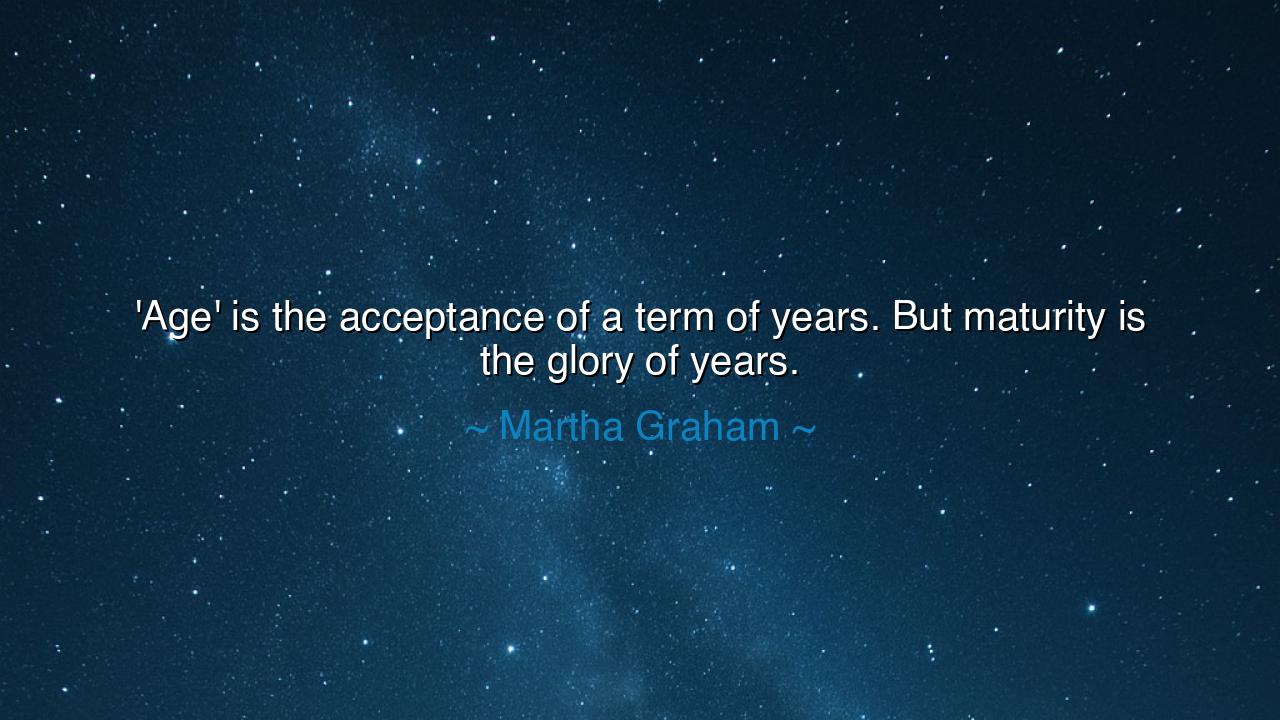
'Age' is the acceptance of a term of years. But maturity is the






"'Age' is the acceptance of a term of years. But maturity is the glory of years." These words, spoken by the legendary Martha Graham, carry a profound message about the nature of aging and the deeper value that lies not in the mere passage of time but in the wisdom and growth that come with it. In her powerful distinction between age and maturity, Graham invites us to reflect on the true meaning of living fully. Age, she suggests, is a simple acknowledgment of the years we have spent on this earth—a numerical fact, a measure of time. But maturity is something far more valuable. It is the glory of those years, the lessons learned, the wisdom gained, and the depth of character that we develop as we navigate life’s challenges.
In the teachings of the ancients, the passage of time was often viewed not as a burden but as a privilege—one that, if embraced correctly, brought the opportunity for growth and self-realization. Socrates, in his wisdom, believed that the true mark of a person was not in their age, but in their ability to continually learn and grow, to deepen their understanding of the world. The great philosophers of ancient Greece did not simply count the years of life; they sought to enrich those years through reflection, introspection, and the pursuit of virtue. To age without acquiring wisdom was to waste the most precious gift of all—the opportunity to become a more complete version of oneself. Graham’s distinction between age and maturity echoes this ancient understanding: time alone does not make us wise; it is how we choose to spend that time.
Consider the life of Nelson Mandela, whose years in prison were long and filled with hardship. Despite the physical toll that age had on his body, Mandela’s maturity shone brightly as he emerged from prison, not as a man broken by time, but as a symbol of wisdom, forgiveness, and hope. His years of suffering did not diminish him; rather, they elevated him to a place of greatness and maturity, where his actions and decisions became a guiding light for the world. Mandela’s life shows that maturity is not about the number of years lived, but about the lessons one learns and the strength of character that grows from those experiences. He embraced his maturity, the true glory of his years, and in doing so, he reshaped the future of his nation.
Martha Graham’s words also invite us to reconsider our own approach to aging. Too often, we view age as something to fear, something that brings inevitable decline. We strive to hold on to youth, clinging to its beauty and vigor, hoping that by doing so, we can stave off the inevitable. But in maturity, we find that there is a glory to be found in each passing year. The lines that mark our faces, the grey that colors our hair, the slowing of our step—they are not signs of decline, but evidence of a life well-lived, full of stories, experiences, and growth. These are the marks of maturity, not the trappings of age.
The wisdom of maturity is not limited to the world’s great leaders or thinkers. It is something available to all who are willing to embrace it. Helen Keller, despite the severe limitations she faced in her youth, reached a level of maturity that transcended her disabilities. She taught the world that true greatness comes not from the physical strength of youth, but from the depth of the spirit. Her years, though marked by struggle, were filled with a quiet glory that stemmed from her inner strength and resilience. Keller’s life is a testament to the fact that maturity is not something that comes with age alone, but with the willingness to learn, to evolve, and to continually grow, regardless of the challenges one faces.
Martha Graham’s quote, then, holds a powerful lesson for us all. Age is inevitable; it is the simple fact of life, the number of years that pass from one moment to the next. But maturity—the glory of years—is a choice. It is the ability to reflect upon those years, to learn from them, and to allow them to shape us into deeper, more compassionate, and more wise beings. The lesson here is not to fear age, but to embrace the opportunity it offers for growth. We should strive not just to live long lives but to live meaningful ones, filled with learning, reflection, and the pursuit of virtue.
In practical terms, this means that we must each look inward as we grow older. Maturity comes not from the external, but from the internal transformation that occurs as we reflect on our experiences and seek to learn from them. We must ask ourselves: how can we use the wisdom of our years to enrich not only our own lives but the lives of those around us? How can we continue to grow, to push the boundaries of what we know, and to deepen our understanding of the world? By living with purpose, by continually seeking growth, we will find that the glory of our years far surpasses the mere counting of them.






AAdministratorAdministrator
Welcome, honored guests. Please leave a comment, we will respond soon